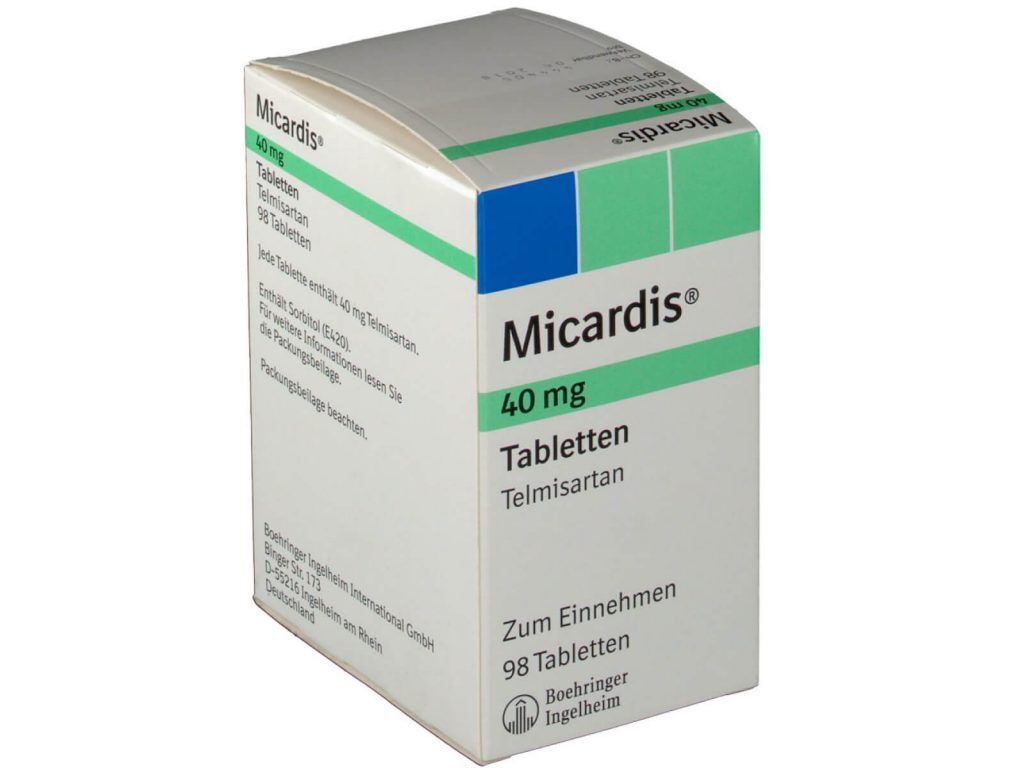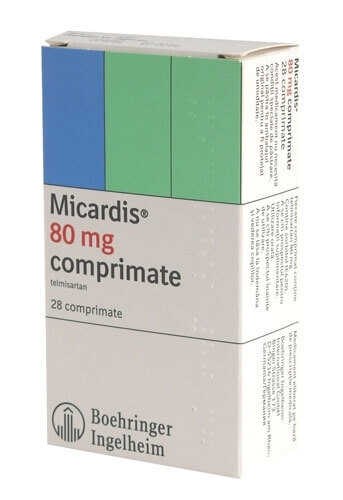Micardis (Telmisartan)

Dosages
Micardis 20 mg
| Quantity | Price per pill | Total price | |
|---|---|---|---|
| 30 | $1.73 | $52.00 | |
| 60 | $1.33 | $80.00 | |
| 90 | $1.19 | $107.00 | |
| 120 | $1.12 | $134.00 | |
| 180 | $1.05 | $189.00 | |
| 270 | $1.01 | $273.00 | |
| 360 | $0.99 | $356.00 |
Micardis 40 mg
| Quantity | Price per pill | Total price | |
|---|---|---|---|
| 30 | $2.47 | $74.00 | |
| 60 | $1.95 | $117.00 | |
| 90 | $1.79 | $161.00 | |
| 120 | $1.69 | $203.00 | |
| 180 | $1.61 | $290.00 | |
| 270 | $1.55 | $419.00 | |
| 360 | $1.52 | $548.00 |
Payment & Shipping
Your order is securely packed and usually ships within 24 hours. Below is what a standard package looks like.
It is about the size of a regular letter (9.4x4.3x0.3 inches) and shows no details about what is inside.



| Shipping Method | Estimated delivery |
|---|---|
| Express Free for orders over $300.00 | Estimated delivery to the U.S.: 4-7 days |
| Standard Free for orders over $200.00 | Estimated delivery to the U.S.: 14-21 days |









Discount Coupons
- Independence Day - July 4, 2026 10% JULY410
- Labor Day - September 7, 2026 7% LABOR07
- Thanksgiving - November 26, 2026 9% THANKS09
Brand Names
| Country | Brand Names |
|---|---|
 Argentina Argentina | Gliosartan Pritor |
 Australia Australia | Pritor |
 Belgium Belgium | Kinzalmono |
 Brazil Brazil | Pritor |
 Czechia Czechia | Kinzalmono Pritor |
 Denmark Denmark | Kinzalmono |
 Finland Finland | Kinzalmono |
 France France | Pritor |
 Germany Germany | Kinzalmono |
 Greece Greece | Pritor |
 Hungary Hungary | Pritor |
 Italy Italy | Pritor |
 Mexico Mexico | Predxal |
 Netherlands Netherlands | Kinzalmono Pritor |
 Poland Poland | Pritor |
 Portugal Portugal | Kinzalmono Pritor |
 Spain Spain | Pritor |
 Sweden Sweden | Kinzalmono |
 Turkey Turkey | Pritor |
| Manufacturer | Brand Names |
|---|---|
| Glenmark Pharmaceuticals Ltd. | Telma |
FAQ
Description
Micardis is prescribed to treat hypertension. This medication widens blood arteries by relaxing them and inhibiting the angiotensin hormone. Keeping your blood pressure under control can help you prevent heart attacks, strokes, and renal problems. In addition to treating congestive heart failure, Micardis can help prevent kidney damage brought on by diabetes.
This medication may be prescribed by your doctor for different reasons. If you would like additional information on this medication, contact your doctor.
Before Treatment
Consult a physician if any of the following apply to you or have previously affected you: an uncommon or allergic response to preservatives, foods, medications, dyes, ACE inhibitors like captopril or lisinopril, or Micardisliver or kidney illness; cardiac issues; diabetes; elevated potassium levels in the blood; extreme dehydration (and electrolyte loss, including sodium depletion).

Dosage
| Condition | Dosage | Administration | Notes |
|---|---|---|---|
| Hypertension | Initial: 40 mg orally once a day | With or without food | Blood pressure response is dose-related (20 to 80 mg). Most effect seen within 2 weeks, maximal after 4 weeks. |
| Maintenance: Individualized dosage | No initial adjustment needed for elderly or renal impairment patients, including those on dialysis. Monitor closely. | ||
| Cardiovascular Risk Reduction | 80 mg orally once a day | With or without food | Lower doses' efficacy in risk reduction is unknown. Monitor blood pressure; adjust other medications if necessary. |
Any medication used in excess might have adverse effects on your health. Get in touch with your healthcare provider right away if you suspect an overdose.
When used in excess, this medication may result in the following side effects: slow or quick heartbeat, feeling faint, or as if you might pass out.
Take the dosage as soon as possible if you forget to take it. Never take two doses at once if your next dose is almost due. Take one dosage at a time.
Warning: Diuretics (water pills) and digoxin (Lanoxin, digitalis) interact.
Give your doctor a complete list of all the medications, herbal remedies, nutritional supplements, and over-the-counter medications you take. Additionally, let them know whether you smoke, take illegal substances, or drink alcohol. Certain things might interfere with your medication.

Adverse Reactions
In case you observe any of the following, get in touch with your doctor right away.
Serious side effects include hives, itching, breathing difficulties, swelling of the face, lips, tongue, and skin rash from allergies, decreased libido and fainting, and variation in the urination volume.
Less severe adverse effects include weakness and back pain, lightheadedness, hazy eyesight, increased perspiration, dizziness, and fatigue.
There could be other negative effects; this is not a complete list. Tell your doctors about all the side effects you encounter.
Precautions
Tell your surgeon that you are taking this medication if you plan to have surgery. Refrain from using potassium supplements or salt replacements unless advised by your doctor. Observe the dietary recommendations of your doctor.
If you are attempting to become pregnant, nursing a child, or are pregnant, speak with your doctor. Take care when standing or sitting up, especially if you are an elderly patient. This lowers the chance of feeling lightheaded or fainting.
Micardis needs to be kept in a firmly closed container at room temperature. Keep out of the light, heat, and moisture. Store away from sinks and bathrooms. Keep Micardis away from animals and out of children's reach.
FAQ
How much time does it take for Micardis to become effective?
Micardis may begin to reduce blood pressure a few hours after the first dose, but it may take a few weeks to feel the drug's full effects. Even if you don't feel the effects of Micardis right away, you must keep taking it as directed.
Can teenagers or children take Micardis?
It is not authorized for teenagers or children under 18 to use Micardis. Its efficacy and safety in this age range have not been proven. For information on the best course of action for treating pediatric hypertension, it is imperative to speak with a healthcare provider.
Is it okay to quit taking Micardis abruptly?
Blood pressure may spike if Micardis is stopped suddenly, particularly if it has been successfully managing hypertension. When stopping Micardis, it's important to carefully follow your doctor's instructions and taper off the medicine gradually while under medical supervision.
Can potassium levels rise while taking Micardis?
Although hyperkalemia, or elevated potassium levels, is uncommon in Micardis users, it is important to periodically check potassium levels, mainly if you also use potassium supplements or potassium-sparing diuretics. Let your doctor know if you suffer from hyperkalemia symptoms, such as tingling, weakness, or an erratic heartbeat.
What is the anticipated duration of Micardis use?
The severity of your problem and how well you respond to the drug are two criteria that determine how long your Micardis treatment will last. For many hypertensive patients, long-term care is necessary to control their blood pressure properly. Even after your blood pressure returns to normal, you must keep taking Micardis as your physician prescribes to keep it under control.














